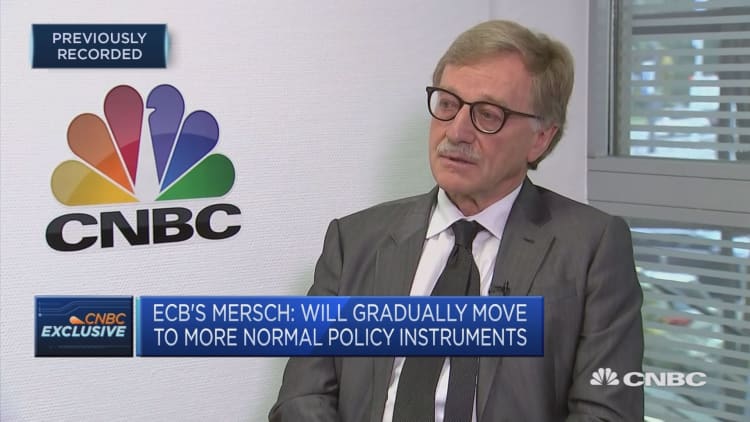
Investors should not expect a ramping up of asset purchases by the European Central Bank (ECB) once its current program comes to an end, one of its board members told CNBC.
"I do not expect that the market would be right to anticipate a further increase of asset purchases at the end of our program," Yves Mersch, member of the executive board of the ECB, told CNBC Thursday.
His comments suggest that the ECB will likely keep its quantitative easing (QE) running for a sufficient amount of time, reducing the need for any further action once its program has been completed.
However, Mersch's caveat was that it was uncertain when this completion would come as the bank will take a gradual approach to monetary policy normalization.
"This path (of monetary tightening) is still needing a certain amount, a certain amplitude of monetary accommodation," Mersch said about the bank's decision to slowly reduce the level of asset purchases.

Despite the improved macroeconomic conditions in the euro zone, the central bank believes that it cannot yet put an end to monetary stimulus — buying bonds to stimulate lending and improve growth. Thus, it decided in October to extend the horizon for its QE program, albeit with a lower volume of bond purchases.
"We said that the improved situation is not warranting the same amount of purchases. But it would nevertheless also be a certain element of presence in the market that would still be warranted, and that's why we also extended the horizon of our purchases," he added.
The ECB announced in October that it will cut the level of bonds it purchases every month, starting in January, to 30 billion euros ($35 billion) from 60 billion euros. The central bank also said that it will extend its program until at least September of next year. But, if at any point, the economic situation changes, the ECB will adapt its policy and could opt for raising its purchases again.
"If there would be additional negative shocks we would not hesitate to react to that," Mersch told CNBC.
Forecasts to be updated in December
The ECB is due to update its economic forecasts at a meeting on December 14. Mersch told CNBC that it's likely that growth expectations will increase and fears regarding a fall in inflation should not materialize.
"I think no one would be overly surprised if we would again slightly revised upwards our projections for growth," he said, and the downfall of inflation "now looks it would be less pronounced and less steep than what might have been feared at one moment."
In September, the ECB estimated a GDP (gross domestic product) rate of 2.2 percent for this year and 1.8 percent for next year and core inflation, excluding energy, to reach 1.2 percent in 2017 and 1.3 percent in 2018.
A second reading from Eurostat confirmed Thursday that the headline annual inflation rate was 1.4 percent in October. Excluding energy and food, inflation stood at 1.1 percent in October.



